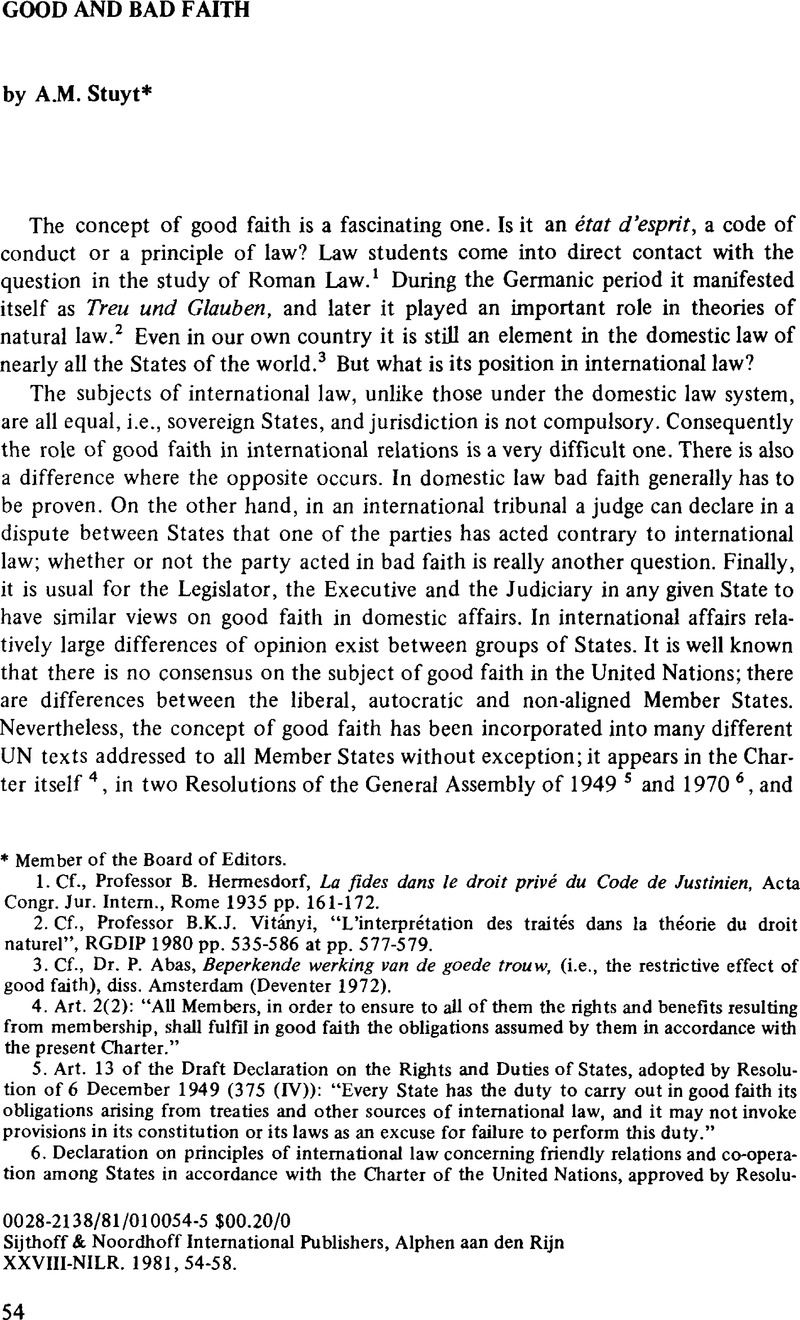
1. Cf., ProfessorHermesdorf, B., La fides dans le droit privé du Code de Justinien, Acta Congr. Jur. Intern., Rome 1935 pp. 161–172Google Scholar.
2. Cf., ProfessorVitányi, B.K.J., “L'interprétation des traités dans la théorie du droit naturel”, RGDIP 1980 pp. 535–586 at pp. 577–579Google Scholar.
3. Cf., DrAbas, P., Beperkende werking van de goede trouw, (i.e., the restrictive effect of good faith), diss. Amsterdam (12 1972)Google Scholar.
4. Art. 2(2): “All Members, in order to ensure to all of them the rights and benefits resulting from membership, shall fulfil in good faith the obligations assumed by them in accordance with the present Charter.”
5. Art. 13 of the Draft Declaration on the Rights and Duties of States, adopted by Resolution of 6 December 1949 (375 (IV)): “Every State has the duty to carry out in good faith its obligations arising from treaties and other sources of international law, and it may not invoke provisions in its constitution or its laws as an excuse for failure to perform this duty.”
6. Declaration on principles of international law concerning friendly relations and co-operation among States in accordance with the Charter of the United Nations, approved by Resolution of 24 October 1970 (2625 (XXV)), seventh principle: “Every State has the duty to fulfil in good faith the obligations assumed by it in accordance with the Charter of the United Nations. Every State has the duty to fulfil in good faith its obligations under the generally recognized principles and rules of international law. Every State has the duty to fulfil in good faith its obligations under international agreements valid under the generally recognized principles and rules of international law…”
7. “The motif of good faith, it is true, applies throughout international relations.” ILC Year-book 1966, vol. II p. 211.
8. Survey of international law, prepared by the Secretary-General of the UN for the ILC, 23 April 1971 (A/CN.4/245), par. 33–37: Fulfilment in good faith of the obligations of international law assumed by States.
9. Vienna Convention on the law of treaties, 23 May 1969 (came into force 27 January 1980), Preamble par. 3: “Noting that the principles of free consent and of good faith and the pacta sunt servanda rule are universally recognized”; Art. 26: “Every treaty in force is binding upon the parties to it and must be performed by them in good faith.”; Art. 31(1): “A treaty shall be interpreted in good faith in accordance with the ordinary meaning to be given to the terms of the treaty in their context and in the light of its object and purpose.” See also Arts. 46(2) and 69(2)(b).
10. Art. 13(4): “The Members of the League agree that they will carry out in full good faith any award or decision that may be rendered…” (by an international tribunal). The analogous Art. 94 of the Charter of the UN does not refer to good faith.
11. Art. 37(2) of the Convention for the pacific settlement of international disputes, The Hague, 18 October 1907 (in force): “Recourse to arbitration implies an engagement to submit in good faith to the award.”
12. Part A, par. X: “Fulfilment in good faith of obligations under international law; see sub pars. 1 and 6.”
13. Ed. Pedone, Paris 1977, 393 pp. with bibliography and two indices.
14. “Contentious matters of international obligations which come before the international judge may call forth the notion of good faith.” (par. 214).
15. Sirey, Paris 1960.
16. Cf., MissZoller's, expression quoted above in the English summary, “spirit of loyalty”, (in French p. 339)Google Scholar.
17. “Good faith is intimately bound with error” is one of the author's conclusions.
18. p. 247.
19. p.91.
20. This article concerns provisions of internal law regarding competence to conclude treaties.
21. Vide supra n. 8.
22. Carl Heymanns Verlag KG, Köln/Berlin 1971, 276 pp. with bibliography and index.
23. Estoppel, acquiescence, prescription.
24. Opinio juris doctrine (American Newhaven School).
25. Treaty v. customary law creation, good faith and error; codification.
26. The author does not deal with Art. 27 of the Vienna Convention of 1969 (p. 276). I do not understand this: are the other parties not protected in the sense of that Article?
27. Art. 2(2) of the Charter, international constitutional custom, binding force of resolutions, etc.
28. Parallelon rerumpublicarwn liber tertius: de moribus ingenioque populorum Atheniensium, Romanorum, Batavorum, edited by Mr. Johan Meerman, Haarlem 1801–1803, in four volumes (Latin text, Dutch translation, commentary).
29. This is chapter VI (vol. I, text pp. 70–101, translation pp. 99–143). Another Dutch translation was published by Mr. A. Stempels: Overgoede trouw en onbetrouwbaarheid (The Hague, Boucher, 1945). Two academics have written commentaries on this work, which is not widely known. The first was ProfessorVan Eysinga, in a communication to the Royal Netherlands Academy of Sciences: “Het oudste bekende geschrift van De Groot over volkenrecht” (Mede-delingen van de Kon. Ak. v. Wet, Afd. Letterkunde, Nieuwe Reeks, deel 4, no. 11, Amsterdam 1941 pp. 463–474)Google Scholar; a short summary in French in Grotiana IX (1941–1942) pp. 59–60Google Scholar. Recently, ProfessorFikentscher, Wolfgang published: De fide et perfidia – Der Treuegedanke in Staatsparallelen des Hugo Grotius aus heutiger Sicht (Munchen 1979, Verlag der Bayerischen Akademie der Wissenschaften, 160 pp.)Google Scholar; commentary pp. 1–88, Latin text and German translation pp. 90–145, with bibliography and index.
30. 1983 is the 400th anniversary of Grotius' birth. In my opinion, this would be a suitable opportunity to devote some attention to his early ideas, especially in the Netherlands, his native country.